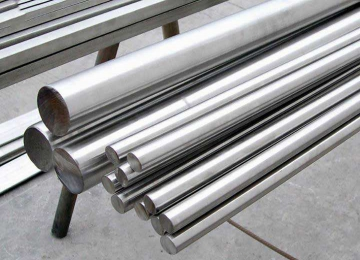
4J42 precision iron-nickel alloy is a fixed expansion alloy, mainly used for sealing structural materials that match the expansion coefficient with soft glass and ceramics within a specific temperature range. By adjusting the nickel content in the alloy, the alloy’s expansion coefficient and Curie point can be adjusted to meet the needs of specific applications. This alloy is widely used in the vacuum industry.
Chemical composition of 4J42 alloy
Material | 4J42 | ||||||||
Chemical composition | C | P | S | Mn | Si | Al | Co | Ni | Fe |
≦0.05 | ≦0.02 | ≦0.02 | ≦0.8 | ≦0.3 | ≦0.1 | ≦1.0 | 41-42.5 | margin | |
Tensile strength of 4J42 alloy wire
Status code | Status | Tensile strength,N/mm2 |
R | soft state | <590 |
I | Hard state | >820 |
Tensile strength of 4J42 alloy strip
Status code | Status | Tensile strength,N/mm2 |
R | soft state | <570 |
I | Hard state | >700 |
Average linear expansion coefficient of 4J42 alloy
Sample heat treatment system | Average linear expansion coefficient a,10-6/ ℃ | ||
| 20~300 ℃ | 20~400 ℃ | 20~450 ℃ |
Heat to 900±20 ℃ in a hydrogen atmosphere, keep warm for 1 hour, and cool to below 200 ℃ at a speed of no more than 5 ℃/min. | 4.0~5.0 | ——- | 6.5~7.5 |
Typical expansion coefficient of 4J42 alloy
Average linear expansion coefficient a,10-6/ ℃ | |||||||
4J42 | 20~ 100 | 20~ 200 | 20~ 300 | 20~ 400 | 20~ 450 | 20~ 500 | 20~ 600 |
5.6 | 4.9 | 4.8 | 5.9 | 6.9 | 7.8 | 9.2 | |
Heat treatment system of 4J42 precision alloy
4J42 precision alloy is an alloy material with special thermal expansion properties and is commonly used in precision instruments and precision measurement equipment. According to the information you provided, the heat treatment system specified in its standards is as follows:
Place the sample in a hydrogen atmosphere.
Heat the sample to a temperature of 900°C ± 20°C.
Keep the sample at 900°C for 1 hour.
Cool the sample at a rate of no more than 5°C/min until the temperature drops below 200°C.
Remove the specimen from the cooling equipment.
The purpose of this heat treatment system is to achieve the required thermal expansion properties of 4J42 precision alloy by controlling the temperature and cooling rate of the sample. Please note that specific heat treatment parameters and regimes may vary according to different standards or specifications, and it is recommended to refer to the corresponding standards in specific applications or consult the material supplier for accurate heat treatment guidance.
Performance characteristics of 4J42 precision alloy
4J42 precision alloy has the following performance characteristics:
Low Temperature Coefficient: 4J42 alloy has a low temperature coefficient, which means that its dimensions change less when the temperature changes.
Excellent mechanical properties: 4J42 alloy has high yield strength, tensile strength and hardness. It has excellent strength and rigidity and can withstand high loads and stresses.
Good corrosion resistance: 4J42 alloy has good corrosion resistance to most corrosive media. It has good stability and durability in chemical environments such as acids and alkalis, and can maintain its performance and appearance for a long time.
Excellent magnetic properties: 4J42 alloy has high magnetic permeability and low magnetic resistance, can effectively absorb and conduct magnetic fields, and is widely used in motors, transformers, sensors and other fields.
Good processing performance: 4J42 alloy can be formed through forging, rolling, drawing and other processes, and can be made into parts of various shapes and sizes.
What are the uses of 4J42?
4J42 precision alloy is mainly used to make iron-nickel alloy strips, rods, tubes, wires and plates that are matched and sealed with soft glass and ceramics on electrical components. In the electric vacuum industry, it is very common to match and seal it with the corresponding soft glass.
In addition, the alloy is mainly used for sealing with soft glass, ceramics and other materials to make leads, frames and sealed plugs for electron tubes, transistors and integrated circuits. In these applications, the properties of 4J42 alloy meet the needs and ensure the stability and sealing of the connection.
All in all, 4J42 precision alloy has important applications in the electronic and electrical industry and the electric vacuum industry. It can be used for various sealing needs and make high-reliability electronic components.
What should you pay attention to when using 4J42 precision alloy?
When using 4J42 precision alloy, there are several points to note:
Select matching sealing materials: During the sealing process, sealing materials that match the 4J42 alloy should be selected to ensure that they have similar thermal expansion coefficients. This can prevent the accumulation of stress in the sealing part due to temperature changes, thereby improving the reliability of the seal.
Controlling heat treatment parameters: For 4J42 alloy, attention should be paid to controlling the grain size during heat treatment to ensure that the material has good deep drawing extensibility. Proper heat treatment can improve the mechanical properties and processing properties of the alloy.
Check the air tightness of the material: When using forging or rolling and other processing methods, the air tightness of 4J42 alloy should be strictly tested. This is to ensure the alloy is intact and free of defects to avoid air leaks or other problems during the sealing process.
In summary, paying attention to these details can ensure that 4J42 precision alloy exhibits good performance and reliability during application.

